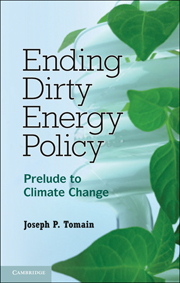Book contents
- Frontmatter
- Contents
- Preface
- Introduction
- 1 A Regulatory History of Dirty Energy Law and Policy
- 2 Protectionist Assumptions
- 3 The Next Generation Is Now
- 4 Consensus Energy Policy
- 5 Fossil Fuel Future
- 6 Electricity Future
- 7 Venture Regulation
- 8 Smart Energy Politics
- 9 Conclusion – Strategies for the Energy Future
- Notes
- Index
1 - A Regulatory History of Dirty Energy Law and Policy
Published online by Cambridge University Press: 05 June 2012
- Frontmatter
- Contents
- Preface
- Introduction
- 1 A Regulatory History of Dirty Energy Law and Policy
- 2 Protectionist Assumptions
- 3 The Next Generation Is Now
- 4 Consensus Energy Policy
- 5 Fossil Fuel Future
- 6 Electricity Future
- 7 Venture Regulation
- 8 Smart Energy Politics
- 9 Conclusion – Strategies for the Energy Future
- Notes
- Index
Summary
Plus ça change, plus c'est la même chose
Thomas Edison would clearly recognize today's electric grid. John D. Rockefeller would also clearly recognize the desire to drill for oil in remote places. Both would recognize our passion for fossil fuels. Neither would recognize the extent of the government regulation of energy or the development of the field of energy law. Energy law, as a legal discipline, grew out of the energy crises and legislation in the 1970s. The first legal casebooks were published at that time, energy law treatises and journals were begun, and the organized bar and law schools began to treat energy law as a recognized field.
At the time, energy issues, particularly high oil prices and the costs of nuclear power, were regular headline news. President Carter staked his presidency, and lost it, on his aggressive, and largely failed, approach to redefining U.S. energy policy. Now, a generation after Carter, we find ourselves confronting another energy crisis in the form of global warming and environmental catastrophes. To date, the energy legislation that has passed Congress has not dramatically reformed U.S. policy. Nevertheless, energy policy makers and energy politics have taken on new configurations as new think tanks, new university-based research centers and institutes, and new non-governmental energy organizations (NGEOs) have entered the energy policy arena. Energy issues are again headline news.
- Type
- Chapter
- Information
- Ending Dirty Energy PolicyPrelude to Climate Change, pp. 11 - 42Publisher: Cambridge University PressPrint publication year: 2011



